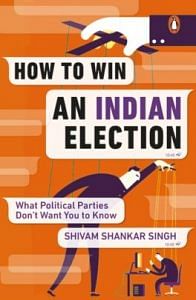While travelling through villages on election work, first in Tripura and then in Madhya Pradesh, I realized that most voters believed that being added to a political WhatsApp group gave them access to some kind of insider information. Instead of being irritated by the messages, they read them with gusto, in the belief that they were receiving information from a credible source. If they received a message on the increase in the speed of rural electrification or on how the Nehru–Gandhi family had lied about their educational background or citizenship, they read them with great interest. The feeling was that they were receiving information that few others were aware of. They then repeated the same information in their everyday conversations with pride, shutting up people in political debates based on information that they had received over WhatsApp. Belonging to political WhatsApp groups was to belong to a community of likeminded people, where they could share and receive information. This made WhatsApp even more potent for political messaging.
Nazi Germany’s Reich Minister of Propaganda, Joseph Goebbels, has several quotable phrases on influencing public opinion. He’s credited for saying, ‘If you repeat a lie often enough, people will believe it, and you will even come to believe it yourself,’ and, ‘Propaganda works best when those who are being manipulated are confident they are acting on their own free will.’ Many in Indian politics may not have heard these quotes or may not even know who Joseph Goebbels was, but the sentiments expressed in these words are what most successful politicians intuitively understand.
Politics at its core is the art of influencing public opinion. Governance requires a party or a leader to figure out what the best policy is and implement it successfully. That is a task that can lead to winning elections, but only when it translates into favourable public opinion. Without an appeal to emotion, development and good governance are both ineffective tools in politics. This is a sentiment that veteran politician and BJP leader Subramanian Swamy expressed in his interview to the Quint in June 2018, where he said that an ‘election is never won on economic performance . . . elections are won on emotions’.
This means that winning elections requires a political party or an individual politician to exercise some control over public opinion. Such control is also required after winning an election, because reforming a system requires a favourable public opinion, which can only be garnered through constant messaging and propaganda. In recent years, social media has emerged as one of the most effective tools in shaping public discourse and influencing what people talk about. The BJP led the way in utilizing Facebook pages, Twitter handles and WhatsApp groups to push through messages that would shape public opinion on issues, and even decide what issues would be discussed in the first place. They are now investing in getting their proprietary NaMo App on as many phones as possible so that they don’t have to depend on third party applications to deliver their message.
***
On 17 August 2018, after former prime minister Atal Bihari Vajpayee passed away, Congress leader Brijesh Kalappa tweeted a laughing photo of Modi, insinuating that the prime minister had been laughing after hearing the news of Vajpayee passing away. As it turned out, Modi had visited AIIMS once at 2.45 p.m., whereas Vajpayee was declared dead at 5.05 p.m.15 Another example of non-rightwing social media accounts sharing fake news was of a video that was shared on several Facebook pages claiming that the UP police had lathi charged unemployed youth sitting on a peaceful dharna outside Chief Minister Yogi Adityanath’s residence. It later turned out that the video was of an incident that took place in Aligarh on 12 June 2018 and, ironically, the people being assaulted by the police weren’t unemployed youth but members of the Hindu Jagran Manch (HJM), a Hindutva outfit.
If the core problem of fake news is not addressed, and the debate remains a battle of political rhetoric between the BJP and the Congress on who generates more fake news, it might eventually turn into a virtual arms race. Every party will work to create fake news on WhatsApp groups, Facebook pages and as many media to reach a voter as possible. Party workers would use these media to spread misleading and false content that supports the narrative they are trying to frame, maybe even without realizing that the content is false, just because of the amount of engagement that such content ends up getting on social media. In a country where political violence, blatant corruption, liquor and cash for votes, and the politics of intimidation are all widespread phenomena, and where booth capturing was a legitimate part of all parties’ election winning strategies not too long ago, expecting parties to not use fake news to their advantage out of their own sense of right and wrong isn’t realistic. India’s low educational standards, which have been further declining in quality in the past decade, also mean there is little hope that the problem of fake news will go away on its own as people start to disregard the content they receive, even when it supports a narrative they already believe.
The challenge of fake news is not an India-centric issue. Democracies across the world are dealing with what has become an influential way of framing the narrative during elections.
 This excerpt has been taken from ‘How to Win an Indian Election’ by Shivam Shankar Singh published by Penguin India.
This excerpt has been taken from ‘How to Win an Indian Election’ by Shivam Shankar Singh published by Penguin India.




if so why BJP was unable to win in Rajashthan Madya predesh recently